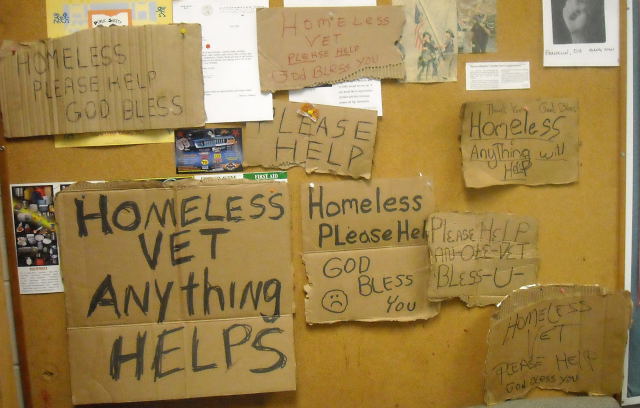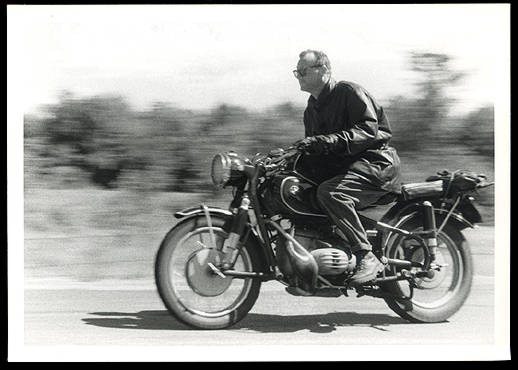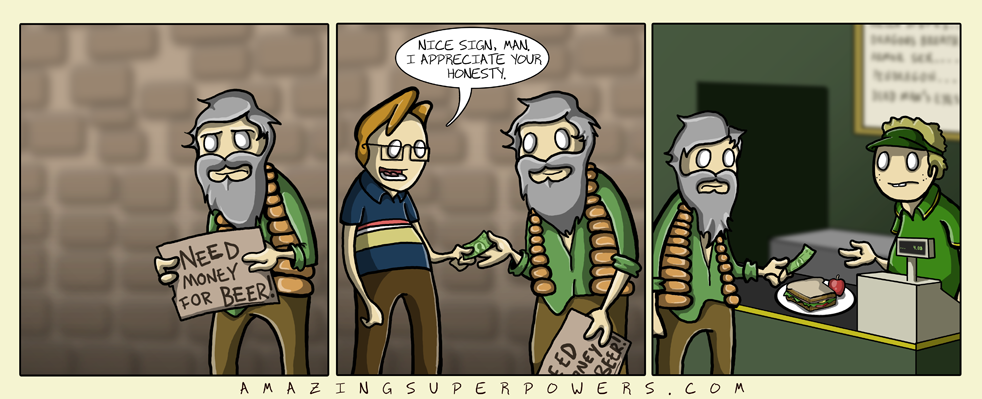
Adam Smith observed in his Lectures on Jurisprudence (1762)–a series of talks that he gave at the University of Glasgow– that national character plays a significant role in economic transactions: the Dutch, he said, are “more faithful to their word” and better at “performing agreements” than the English, and the English more faithful than the Scots.
In the past few months, I’ve observed a similar kind of cultural variation in a much more prosaic setting: the panhandling interaction.
If you’re from North America, as I am, you’ve probably seen people on the street requesting money from strangers using appeals such as “Homeless—Please Help” or “Homeless Veteran.” There are a number of variations, but homelessness is the common theme in many cases.

Elsewhere in the world, panhandlers use quite different rationales—or what the great mid-century sociologist C. Wright Mills would call “vocabularies of motive.” Mills wasn’t interested in what actually motivated people—such as what psychologists would term “needs” or “drives”—but rather in the ideologically-charged terms they used to justify their actions to themselves and others. As he observed, some motives are more acceptable than others, and we can learn something about local cultures based on what passes for a “good reason.”

So it’s sociologically interesting that within the North American context, the concept of “home” has such resonance that the claim of “homelessness” is considered a compelling and sufficient motive for giving money to strangers. But while the need for shelter would seem universal, it’s rare to see a panhandler outside North America requesting a donation on the basis of homelessness.
In Germany, for example, one often finds people begging for “trinkgeld”—“drinking money.” And they’re not playing for laughs, as one sometimes finds in the US, when panhandlers give a wink and a nod to the stereotype that money given to beggars is only ever used to buy alcohol (or drugs). When a panhandler asks for “drinking money” in the US, it’s sort of an in-joke, or an attempt to appear disarmingly honest; based on the limited examples I’ve seen, this seems to jolly people up and get good results (i.e., quantities of cash).
But in Germany, drinking money is serious business. In the four years I lived in the Rhine Valley, I saw dozens of men (always men) on public transport and on the street, asking for “trinkgeld, bitte” in monotonous, dirge-like tones that seemed to express just how grim a fate it was to lack beer money. Equally surprising to me was the willingness of Germans to open their purses for this reason, as if it was a truth universally acknowledged that a man with empty pockets must be in want of a beer. In the interactions I witnessed, no one on either end of the transaction ever smiled.

Yet another vocabulary of motive can be found on the streets of Istanbul, where panhandlers often approach passers-by with a request for “ekmek parası”—Turkish for “bread money.” In perhaps 10 visits to Turkey in the last 3 years, I’ve never seen anyone on the street claiming to be homeless. Nor have I seen a cardboard sign of the kind so common in North America.
In all three settings, the vocabularies of motive among panhandlers have a common theme of need: for shelter, drink or food. What’s interesting is how each cultural setting changes the calculus about what kind of motive is most likely to bring in the cash. Perhaps it comes down to what each society views as among the basic human rights: in the US, shelter has a plausible claim to that status, but beer does not; whereas in Germany, it an appeal for “trinkgeld” succeeds as an appeal to common humanity and decency; in Turkey, hunger seems to trump all other claims.
Have you seen other variants in national culture and vocabularies of motive when it comes to panhandling? Your examples (and analyses) are welcome.

Comments 17
The Sociology of Everything – Panhandling | The Global Sociology Blog — August 31, 2010
[...] but not updated often enough for my taste!, Economic Sociology, Brooke Harrington discusses panhandling variations depending on the national context. That is, what kind of script do panhandlers invoke to get the [...]
McSimilian — September 2, 2010
But “trinkgeld” just literally means ”drinking money”. Whereas it is actually the main German expression for "tip" as in what you give waiters et al..
So people being asked for "Trinkgeld" have a different picture in their head.
Otherwise a very interesting article and direction of thought.
Michael — September 2, 2010
Hi,
You might find the the following video interesting, since it doing the viral rounds at the moment. Its of a guy with a sign looking for 'Weed Money'....but as you mentioned above, the sign also says 'Keeping it real'.
http://www.worldstarhiphop.com/videos/video.php?v=wshhbE3OJX12YnK2q2b2
Thomas — September 2, 2010
I'm German, but never experienced it as such - maybe coming from East-Germany makes it different (much less panhandlers too).
"Trinkgeld" I would never connect with money for drinking. It is usually meant as tip - or in that case simply "small leftover change".
If somebody would ask directly for alcohol money, it would be either have to be a good joke, or it would be generally also seen as unfitting.
The missing request for shelter in Germany is IMO more connected to the fact that there is no such thing as homelessness in Germany. So it wouldn't make sense. The government supplies everyone a home, even if you would burn it down each time. Homeless people in Germany are that by their own choice or maybe very special circumstances.
Often the requests are for food, and sometimes people rather buy those people food and give it directly, because they don't want to fund any drugs.
Thomas — September 2, 2010
Hi Brooke,
I'm sure the basic reason for less panhandlers in East Germany is that there were none of them at socialistic times. Everyone had work, and there was next to no income equality (except for the really high-ups that had a lot).
Even if somebody would have been needy though, the government would have surely prevented anyone from showcasing it. It would not have fitted in the narrative of the socialistic heaven.
So I would say today it is just an outcome of that - maybe it is just a matter of time until it will be similar as in the West. Inequality is still less than in the West, but rising as unfortunately everywhere.
That the Wessies see the Ossies as slackers is not really based in facts I guess. It is because after the wall fell, the west had to put a lot of money into the east, to build it up. There is still a tax (called solidarity fee) which goes to the eastern states - and some may read that as the Easterners being to lazy to work themselves.
By the way: great blog you got there. I like your fresh perspectives on things.
Rafael — September 2, 2010
In Turkish it's not “etmek parası” but “ekmek parası”
Mikkel — September 4, 2010
With the big recession we might see more of these signs:
http://simplyzesty.com/wp-content/uploads//2009/11/will_code_for_food.jpg
And can't help smiling, even though the man pictured doesn't seem to enjoy the situation.
Mickey — September 5, 2010
Thank you for an interesting post. It made me think what the panhandlers in Israel (where i live) write on the signs they hold. They don't refer to homelessness (though we don't have public housing as massive as in Germany). Actually, they even don't ask money for themselves, but rather to provide food to their children. In more religiously-orthodox communities the signs call to donate money so the beggar's family would have a proper meal for Sabbath.
Unfortunately, in recent years Israel has been experiencing a rise in the number of beggars, but that's a different subject.
lex — September 18, 2010
Fascinating. I had to panhandle to survive for a bit in 2008, and always cited my need to pay for my nightly "rent", sleeping on a guy's couch. This was because it was the truth. However, I also, as an experiment, a few times said I needed the money to stay on "my drug program" or "my methadone program" or so on, to make myself look like the drug-user and drinker most are convinced panhandlers are - even though I'm clean as a whistle. I talked a bit with a guy in a wheelchair who has to panhandle a bit to suppliment his SSI, and he had great success with "WHY LIE, I NEED A DRINK" held outside a local liquor store. The problem for him was, just as I don't smoke etc., he doesn't drink! He often had to sell off bottles of booze that were put in his lap.
I found this negative view of panhandlers - that they do it for drink or drugs - annoying, but I promise that if I have to panhandle ever again (I hope not!) I'll play it up as being the biggest druggie I can pass myself off as, perhaps even work on a convincing stagger. My bad eye (yeah one doesn't work too well) may help create a drugged look, lol. What's funny is, I never mentioned to anyone being a vet, guess the old "need to know" stuff has always stayed with me.
Wondering — September 19, 2010
What I am wondering is, how was that "sampler of panhandling signs" collected?
Gray — January 19, 2011
Hi Brooke - I've enjoyed reading through your posts. I believe that the original panhandlers (an American term) were a certain people of German origin, whose reputation was established before they arrived. That's not in the dictionary, but I hope to have a write-up soon.
Karl — December 4, 2011
I'm German too, and I agree with Thomas that "trinkgeld" in this context refers to "small left-over change". It's a way to ask for not too much, so as to stay humble and thus appear more appealing. It certainly does not imply asking for money to drink. In Berlin, beggars used to ask for "one mark", asking whether one had a spare Mark left, or even a "Groschen" an old German word meaning ten Pfennig (what used to be the cent to the Mark) and now by extension ten Euro cent. I do not agree with Thomas however that in Germany homelessness is basically the choice of the homeless, because of the availability of public housing. I don't know whether to call this view reactionary or just extremely naive. Homelessness is a very complex phenomenon that has many and diverse factors, including very prominently psychological ones. Even to obtain public housing one must be "in the circle", inside society, in terms of normal interaction with the authorities, which is something homeless people precisely have become incapable of, for reasons that are as various as their personal histories.